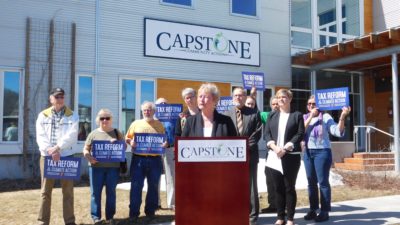Donald Trump’s anti-climate agenda threatens Vermont’s economy and endangers Vermonters’ health. While the president retreats to bygone days when coal was king, there are no coal mining jobs in Vermont. There are, however, 17,000 Vermonters whose jobs in clean energy are threatened by his policies. And every Vermonter needs to be concerned that the president will allow more mercury, lead and arsenic – just some of the deadly byproducts of coal combustion — into our air and water.
There’s a better way.
While Vermont can’t avoid all of the impacts of the president’s destructive agenda, we can mitigate the damage. As a state, we can continue our progress towards our long-term clean energy goals. Doing so will create jobs and strengthen our economy; it will keep our energy dollars local; and it will reduce Vermont’s contribution to global warming.
In addition – and readers might be surprised by this – we can also cut taxes. By aligning our tax code with our priorities we can reduce taxes on Vermonters’ homes, incomes and necessities. To keep the budget balanced, we can put a price on something the vast majority of Vermonters don’t want – the pollution causing climate change.
As Vermont legislators we have introduced four bills to do just that. One bill would eliminate the sales tax. A second would provide property tax relief. A third would reform income taxes and double the Earned Income Tax Credit. A fourth bill would provide every Vermonter a climate dividend check every three months.
Each of these bills is “revenue neutral,” meaning state government won’t grow.
Each of these bills is conservative in concept and progressive in application. They’re conservative because individual Vermonters – not state government — will drive the market by choosing for themselves if and how they would like to reduce carbon emissions. They are progressive because low- and middle-income Vermonters — who typically burn fewer fossil fuels than their wealthier neighbors – would pay less in fees, while all Vermonters would benefit from lower taxes.
Each of these bills would spur innovation, create jobs and benefit current and future generations of Vermonters.
Our bills are not comprehensive. They are designed to get Vermonters and policymakers thinking about what makes sense to tax, and what doesn’t. As we grapple with demographic shifts, climate change and recurring budget crises, it is worth asking questions like: If we want more commerce in Vermont – why do we tax sales? If we want more Vermonters in the workforce and more companies hiring – why do we tax payrolls as much as we do? If we want to reduce global warming emissions that are damaging Vermonters’ health and environment – why don’t we charge for carbon pollution?
Dozens of nations and states put a price on carbon pollution – and their economies are growing. California introduced a carbon price in 2013 and has created over 1.5 million new jobs since then. That’s almost three times as many new jobs in California as there are Vermonters!
As veteran legislators, we are not na ve about the challenges of reorienting Vermont’s economy away from fossil fuels. We expect our bills will generate howls of protest from the oil and gas lobby and their special interest allies, but that’s because they are the protectors of the status quo. Their job is to protect fossil fuel company profits. Our job is to listen to Vermonters’ concerns about their jobs, family’s health and way of life, and then work together to find solutions that will improve the lives of every Vermonter.
Our bills start a conversation, and like it or not, we have to have this conversation. President Trump’s draconian budget will wreak havoc on Vermont, necessitating a larger review of Vermont’s values and budget priorities in the months ahead.
This conversation need not be partisan. One of our bills is modeled off of “The Conservative Case for Carbon Dividends” that was proposed by James Baker, George Shultz and Henry Paulson – all cabinet secretaries from the Reagan and Bush administrations. Locally, it was Republican Governor Jim Douglas who introduced and implemented Vermont’s first price on carbon pollution in our electric sector, and it is working. Vermont’s economy is growing faster than the rest of New England while we have the second lowest electric rates in the region. Because our bills are all revenue neutral, none of them would violate Governor Phil Scott’s desire to hold state spending in check.
Here in Vermont, we don’t suffer from the same epidemic of head-in-the-sand climate science denialism that infects the White House. We know that climate change is real and it’s a threat to the Vermont way of life. But Donald Trump’s policies will only accelerate climate change and endanger the jobs and health of thousands of Vermonters. That’s why it’s so important that we fight back against the economic and environmental damage his policies will cause.
Tax reform and climate action may be Vermont’s most effective response.
— This column was authored by House Reps. Sarah Copeland-Hanzas, D-Bradford, Johannah Leddy Donovan, D-Burlington, Diana Gonzalez, P-Winooski, and Martin LaLonde, D-South Burlington

